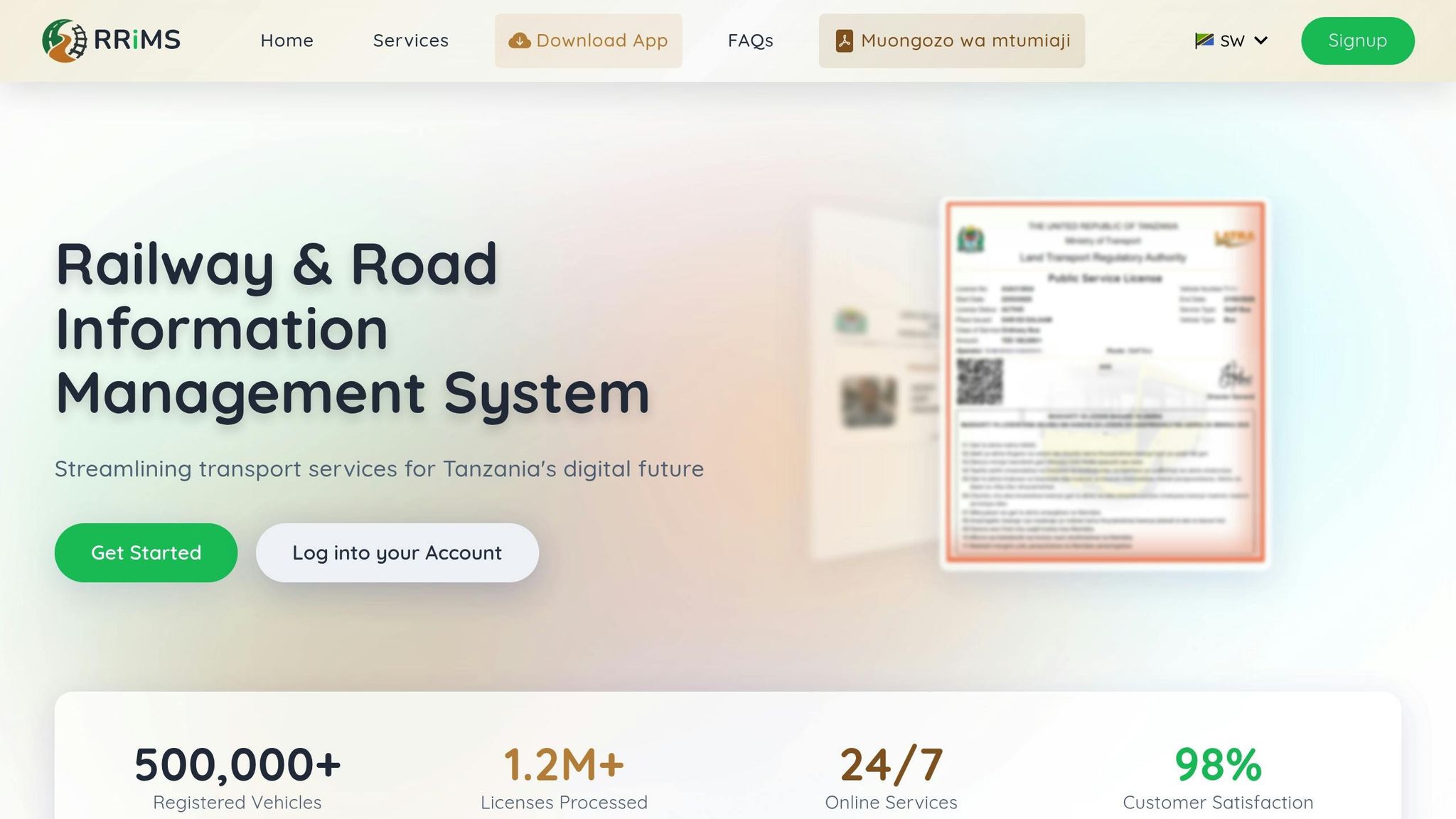When buying or selling a vehicle in Dar es Salaam, transferring ownership is mandatory to avoid legal and financial risks. Both sellers and buyers must follow specific steps outlined by the Tanzania Revenue Authority (TRA). Sellers are responsible for notifying the TRA, initiating the transfer, and ensuring the buyer’s name is updated in the registry. Buyers must complete the registration, pay a 1% stamp duty fee, and provide proper identification and documentation. Delays in this process can lead to fines, tax penalties, or legal disputes for both parties.
Key Steps to Transfer Ownership:
- Sign a Sale Agreement: Include vehicle details and payment terms.
- Notify TRA: Sellers must inform the TRA of the sale.
- Submit Documents: Both parties provide required paperwork, including IDs, proof of address, and TIN certificates.
- Pay Transfer Fees: Settle all applicable fees promptly.
- Get a New Registration Card: Verify details on the updated card.
Common Mistakes to Avoid:
- Losing original documents.
- Delaying the transfer process.
- Falling for scams or undervaluing the vehicle.
Using TRA’s online RRIMS system can simplify the process, but in-person visits to TRA offices may be necessary for complex cases. Always verify the vehicle’s history and ensure all paperwork is complete to avoid future issues.
Legal Requirements and Responsibilities
In Tanzania, both sellers and buyers must adhere to specific legal obligations when transferring vehicle ownership. These responsibilities, rooted in the Road Traffic Act, help ensure a smooth and lawful transfer process while avoiding unnecessary complications.
Transfer Duties for Sellers and Buyers
Sellers carry the primary responsibility for initiating the ownership transfer. According to FB Attorneys:
"Moreover, it is the seller of a motor vehicle who has the obligation under section 16 of the Road Traffic Act to notify the TRA on the disposition of a motor vehicle and apply for the change of ownership from him to the buyer."
This means sellers are legally required to inform the Tanzania Revenue Authority (TRA) about the sale and apply for the ownership change.
Once the TRA processes the transfer, sellers have additional tasks. They must request a deregistration letter from the TRA and confirm that the buyer’s name is updated in the vehicle registry system. Sellers should also cancel or transfer their insurance and notify LATRA or local authorities to avoid future liabilities.
Buyers also play an important role in the transfer process. After the seller initiates the transfer, buyers must complete the registration process. Both parties are required to sign a sales agreement to formalize the transaction, offering legal protection to everyone involved. Additionally, buyers are responsible for paying a 1% stamp duty fee on the sale price to the TRA during the registration transfer.
For added security, it’s recommended to have a witness present or consult a lawyer when signing the sales agreement. When handling cash payments, meet in secure public places like bank parking lots or near police stations.
Promptly completing these steps ensures compliance and avoids the potential legal issues discussed below.
Legal Risks of Delayed Transfer
Delays in transferring ownership can lead to serious legal risks for sellers. Under the Road Traffic Act, the registered owner is presumed to be the legal owner of the vehicle. FB Attorneys highlights:
"Section 15 of the Road Traffic Act creates a presumption of ownership of a motor vehicle in that, a person in whose name the motor vehicle remains registered is presumed to be the owner of the vehicle unless it is proved to the contrary."
If the transfer isn’t completed promptly, sellers may remain liable for incidents involving the vehicle, including accidents or violations. Proving that you no longer own the vehicle can be both time-consuming and costly, potentially leading to legal disputes and financial penalties.
Beyond legal challenges, delayed transfers can result in tax penalties, ongoing insurance responsibilities, and difficulties in proving you’ve relinquished ownership. To avoid these risks, finalize the transfer as soon as payment is confirmed. Refrain from handing over vehicle documents until payment clears, and ensure all personal data is removed from the vehicle. Whenever possible, use secure payment methods like M-Pesa, Airtel Money, or bank transfers instead of cash for added security.
Required Documents
Having the right paperwork in order is key to ensuring a smooth ownership transfer in Dar es Salaam. Both the seller and buyer must present specific documents to meet TRA requirements and finalize the legal process. Here’s a clear breakdown of what each party needs to provide.
Seller’s Required Documents
- Proof of address: This confirms the seller’s residence. Acceptable forms include utility bills or bank statements that clearly display the current address.
- TRA TIN Certificate (Tax Identification Number): This is a must-have for the ownership transfer process. It confirms the seller’s registration with the tax authority and helps track taxes related to the transaction.
Buyer’s Required Documents
- Valid national ID or passport and proof of address: The buyer must provide identification along with proof of address, such as a utility bill, rental agreement, or bank statement. These documents ensure the vehicle is properly registered under the buyer’s name and that any official communication regarding the vehicle reaches the right person.
- Completed and signed sale agreement: This document formalizes the terms of the transaction.
Why a Sale Agreement Matters
A signed sale agreement is essential for both parties. It clearly lays out the terms of the sale, reducing the chance of ownership disputes in the future. This document acts as a safeguard, providing clarity and legal protection for everyone involved.
How to Transfer Vehicle Ownership: 5 Steps
Once you have all the necessary documents, follow these five steps to complete the vehicle ownership transfer without any hassle.
Step 1: Finalize the Sale Agreement
Start by drafting a comprehensive sale agreement. Include essential details like the vehicle’s make, model, year, color, registration number, chassis number, and engine number. Clearly state the purchase price in both figures and words (in Tanzanian Shillings), along with clear payment terms.
For instance, breaking down payment specifics and listing vehicle details in detail adds clarity to the agreement.
Make sure the agreement also includes clauses confirming the seller’s legal ownership, absence of any liens, and an indemnification clause governed by Tanzanian law.
Step 2: Notify the TRA
Once the sale agreement is signed, the seller must inform the Tanzania Revenue Authority (TRA) about the transaction. This step is critical for initiating the transfer process and shielding the seller from future liabilities. The notification can be done in person at TRA offices or through the online RRIMS system. Be sure to include the sale date, buyer’s details, and vehicle information.
Step 3: Submit the Required Documents
Both the buyer and seller need to provide all the necessary documents. These include the completed sale agreement, valid identification, proof of address, and TRA TIN certificates. Submissions can be made at TRA offices or through the RRIMS system. Double-check that all details match exactly to avoid any processing delays.
Step 4: Pay the Transfer Fees
Settle all applicable transfer fees, which may include taxes, processing charges, and any penalties. Payments can be made via cash, bank transfer, or certified check. Keep all payment receipts as proof. Paying promptly helps you avoid additional penalties.
Step 5: Collect Your New Registration Card
Once all documents are approved and fees are paid, the TRA will process the application and issue a new registration card. When you receive it, verify that all the details are correct to prevent future complications. At this stage, you’re almost done – just take a moment to review any associated fees, timelines, or potential errors to ensure everything is in order.
sbb-itb-d9186c2
Costs, Processing Times, and Mistakes to Avoid
When transferring a vehicle, it’s important to understand the associated costs, how long the process might take, and the common errors that could lead to delays. Being informed can save you time, money, and unnecessary stress.
Transfer Costs and Late Fees
The cost of transferring a vehicle depends on the situation. Standard transfer fees apply to all transactions, but you may face extra charges if you need to replace missing documents. For instance, duplicate fees are TZS 50,000 (about $19.23) for motor vehicles, TZS 30,000 (about $11.54) for tricycles, and TZS 20,000 (about $7.69) for motorcycles. To avoid these additional costs, keep your original documents safe and secure.
How Long the Process Takes
The transfer process can be relatively quick if all your paperwork is in order. However, delays are not uncommon. For individual transfers, issues like undervaluation or outdated TIN (Taxpayer Identification Number) details can slow things down. Transfers involving limited companies may face additional holdups due to undervaluation concerns or missing directors’ consents. Seasonal factors and the workload at the Transport Regulatory Authority (TRA) can also affect processing times.
Mistakes That Cause Delays
Certain mistakes can derail your vehicle transfer, leading to unnecessary delays or even financial losses. Here are some common pitfalls to watch out for:
- Lost original documents: Without the necessary paperwork, the transfer cannot move forward.
- Delaying the application: Postponing the transfer process can result in penalties for the seller and complications for the buyer.
- Falling victim to scams: Be cautious when dealing with unverified third parties. For example, in April 2023, a South African buyer lost R3,000.00 after attempting to transfer a vehicle purchased from their former boss. The seller falsely claimed the car had been settled with the bank, but it was still registered under the bank’s name, and key documents were missing. A scammer who offered to assist only added to the financial loss.
- Undervaluing the vehicle: Declaring a lower purchase price to reduce taxes can attract TRA scrutiny. This may result in rejected applications or requests for additional proof of the actual transaction value.
To avoid these issues, ensure you prepare a detailed bill of sale. This document should include the Vehicle Identification Number (VIN), the buyer’s full details, and the exact odometer reading. Both parties must sign it, and you should submit it promptly to the TRA. Additionally, familiarize yourself with local rules, such as those regarding license plate management, to ensure you meet all requirements. Taking these steps can help you sidestep unnecessary complications and keep the process running smoothly.
Helpful Tips and Resources
If you’re navigating the process of vehicle ownership transfer, these tips and tools can make the experience smoother and more manageable. With a few resources at your disposal, you can save time and avoid unnecessary complications.
Using RRIMS Online System

The Road and Railway Integrated Management System (RRIMS) is a digital platform designed to simplify vehicle licensing and registration processes. Available 24/7, it allows you to handle these tasks without visiting TRA offices in person.
To get started, create an account at rrims.latra.go.tz or download the mobile app from your app store. Once registered, select the service you need and upload the required documents. The approval process typically takes 1–3 business days.
Many users have found RRIMS to be a game-changer:
"RRIMS has simplified our fleet management. We can now handle all licensing and permits in one place." – John Mwamba, Transport Company Owner
"As a driver, I appreciate how easy it is to renew my license and check my status through the mobile app." – Sarah Juma, Professional Driver
TRA Office Locations in Dar es Salaam
While many tasks can be completed online, some situations require an in-person visit. Dar es Salaam has several TRA offices equipped to assist with vehicle ownership transfers.
| Office/Unit Name | Address | Working Hours (Mon–Fri) | Specialization |
|---|---|---|---|
| Samora Motorvehicle | Samora Building, Samora Street | 8:00 AM – 5:00 PM | Motor vehicle registration, change of ownership |
| Motor Vehicle Registration Unit (Samora Branch) | Samora House, Samora Street | 7:30 AM – 1:00 PM, 2:00 PM – 5:30 PM | Motor vehicle registration, change of ownership |
| TRA Headquarters | 28 Edward Sokoine Drive, Ilala CBD | 8:00 AM – 5:00 PM | General administration, complex cases |
Regional offices in Ilala (Diamond Plaza Building, Samora-Mirambo Street), Kinondoni (PSSSF Commercial Tower, Sam Nujoma Road), Tegeta (Kibo Complex Building, Bagamoyo Road), and Temeke (PSSSF Quality Plaza Building, Mwalimu Nyerere Road) also offer general tax services and handle regional matters. If the seller is untraceable, you’ll need to submit your ownership transfer application to TRA offices that specialize in handling CMVRS issues.
How to Check Vehicle History
Before finalizing an ownership transfer, it’s crucial to verify the vehicle’s history. This step helps you avoid fraud and unexpected issues down the line. Start with a thorough physical inspection of the vehicle and its documents. Look for any signs of damage or tampering.
Pay close attention to the Vehicle Identification Number (VIN). Ensure the VIN on the vehicle matches the one on all related documents. Be alert for signs of tampering on VIN plates, as this could indicate theft or fraud. Key documents to review include the Vehicle Registration Certificate, Roadworthiness Certificate from TBS, and service history records. Also, confirm the validity of import and title documents, and check maintenance records and odometer readings for any inconsistencies.
Make sure the logbook or title is available and can be transferred to your name through TRA. Companies like SGS provide vehicle title verification services, including digital imaging and online management, to ensure accuracy. For added peace of mind, consider a professional inspection. A motor vehicle inspection for a Certificate of Roadworthiness from TBS costs TZS 350,000 (approximately $134.62), a small price to pay to avoid larger expenses later.
During your inspection, watch for warning signs such as major repairs without documentation, unresolved recalls, or reluctance from the seller to provide complete paperwork. Verifying the vehicle’s history is an essential step that complements the document review and transfer process mentioned earlier.
Conclusion
Transferring vehicle ownership in Dar es Salaam requires careful attention to detail and strict adherence to the outlined steps. The process includes completing a sale agreement, notifying the TRA, submitting all necessary documents, paying the transfer fees, and obtaining a new registration card. Each step is essential to ensure legal and financial security for both buyer and seller, minimizing the risk of future disputes.
When visiting TRA offices or authorized centers, insist on certified documents, confirm that all taxes and transfer processes are finalized, and always request official receipts. Be cautious of any deviations from the standard procedures, as these could lead to complications.
For buyers, verifying every document is a non-negotiable step. This diligence helps avoid legal troubles and ensures the transaction is legitimate.
Skipping steps or taking shortcuts can lead to costly consequences. As the Daily News wisely puts it:
"A low price is no compensation for legal risk. Compliance and prudence are the real investments – protecting both individual interests and national integrity." – Daily News
FAQs
What legal issues could arise if I delay transferring vehicle ownership in Dar es Salaam?
Delaying the transfer of vehicle ownership in Dar es Salaam can bring about serious legal and financial headaches. Until the transfer is finalized, the original owner remains liable for any fines, traffic violations, or legal issues tied to the vehicle. This means they could unexpectedly face penalties or even lawsuits for actions they had no part in.
On top of that, postponing the transfer can create problems down the road with vehicle registration or proving rightful ownership. These delays might lead to disputes or penalties from authorities, making the situation even more complicated. To steer clear of these potential issues, it’s crucial to complete the ownership transfer promptly after the sale.
How can I check a vehicle’s history before buying it in Dar es Salaam?
Before making a purchase, it’s crucial to confirm that the VIN (Vehicle Identification Number) matches the details on the registration certificate. Also, go through the vehicle’s service records to ensure it has been well-maintained. For extra assurance, you might want to hire a professional inspection service that’s recognized by the Tanzania Bureau of Standards.
It’s equally important to verify the vehicle’s roadworthiness and import status. You can do this through official channels like the Tanzania Revenue Authority or the Tanzania Trade Portal. Taking these steps can help you spot any hidden problems or irregularities before committing to the purchase.
How can I transfer vehicle ownership online using the RRIMS system in Tanzania?
To transfer vehicle ownership online through Tanzania’s RRIMS system, start by heading to the official portal. Log in to your account, or create one if you’re new to the system. After logging in, select the ownership transfer option, then enter the vehicle details and upload the necessary documents, such as proof of sale and identification.
Once you’ve submitted the required information, proceed to pay the applicable fees online. The system will begin processing your request. In some cases, you might be required to visit a local office for verification or to complete additional steps. Make sure to carefully follow any instructions provided to ensure the transfer goes smoothly.
Related Blog Posts
- Car registration costs in Tanzania
- How to transfer vehicle ownership in Tanzania: full guide
- Vehicle title transfer in Tanzania: avoid these mistakes
- Vehicle ownership change in Tanzania: stepwise instructions




